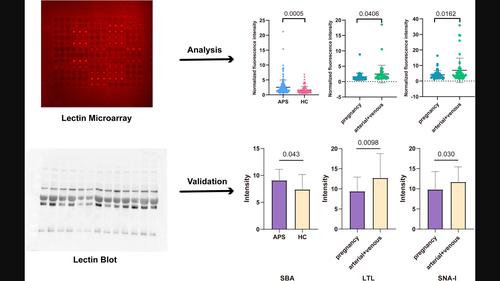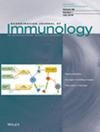Changes in serum immunoglobulin G glycosylation patterns for antiphospholipid syndrome patients with lectin microarray
IF 4.1
4区 医学
Q2 IMMUNOLOGY
引用次数: 0
Abstract
Antiphospholipid syndrome is a rare autoimmune disease characterized by persistent antiphospholipid antibodies. Immunoglobulin G plays a vital role in disease progression, with its structure and function affected by glycosylation. We aimed to investigate the changes in the serum immunoglobulin G glycosylation pattern in antiphospholipid syndrome patients. We applied lectin microarray on samples from 178 antiphospholipid syndrome patients, 135 disease controls (including Takayasu arteritis, rheumatoid arthritis and cardiovascular disease) and 100 healthy controls. Lectin blots were performed for validation of significant differences. Here, we show an increased immunoglobulin G‐binding level of soybean agglutinin (

利用凝集素芯片分析抗磷脂综合征患者血清免疫球蛋白 G 糖基化模式的变化
抗磷脂综合征是一种罕见的自身免疫性疾病,其特征是持续存在抗磷脂抗体。免疫球蛋白G在疾病进展中起着至关重要的作用,其结构和功能受糖基化的影响。我们旨在研究抗磷脂综合征患者血清免疫球蛋白G糖基化模式的变化。我们对 178 名抗磷脂综合征患者、135 名疾病对照组(包括高安动脉炎、类风湿性关节炎和心血管疾病)和 100 名健康对照组的样本进行了凝集素芯片分析。为验证显著差异,还进行了凝集素印迹分析。在此,我们发现与健康对照组和疾病对照组相比,抗磷脂综合征患者体内大豆凝集素的免疫球蛋白 G 结合水平升高(p = 0.047,更倾向于 N-乙酰半乳糖胺)。此外,与单纯血栓事件患者相比,被诊断为妊娠事件的抗磷脂综合征患者的免疫球蛋白 G 的岩藻糖基化(p = 0.001,被四角莲识别)和硅烷基化(p = 0.030,被黑三叶草 I 识别)水平较低。这些结果表明,抗磷脂综合征患者的血清免疫球蛋白G糖基化谱具有独特性,可为今后的研究提供参考,从而设计出生物标记物,更准确地诊断抗磷脂综合征,甚至预测患者的临床症状。
本文章由计算机程序翻译,如有差异,请以英文原文为准。
求助全文
约1分钟内获得全文
求助全文
来源期刊
CiteScore
7.70
自引率
5.40%
发文量
109
审稿时长
1 months
期刊介绍:
This peer-reviewed international journal publishes original articles and reviews on all aspects of basic, translational and clinical immunology. The journal aims to provide high quality service to authors, and high quality articles for readers.
The journal accepts for publication material from investigators all over the world, which makes a significant contribution to basic, translational and clinical immunology.

 求助内容:
求助内容: 应助结果提醒方式:
应助结果提醒方式:


